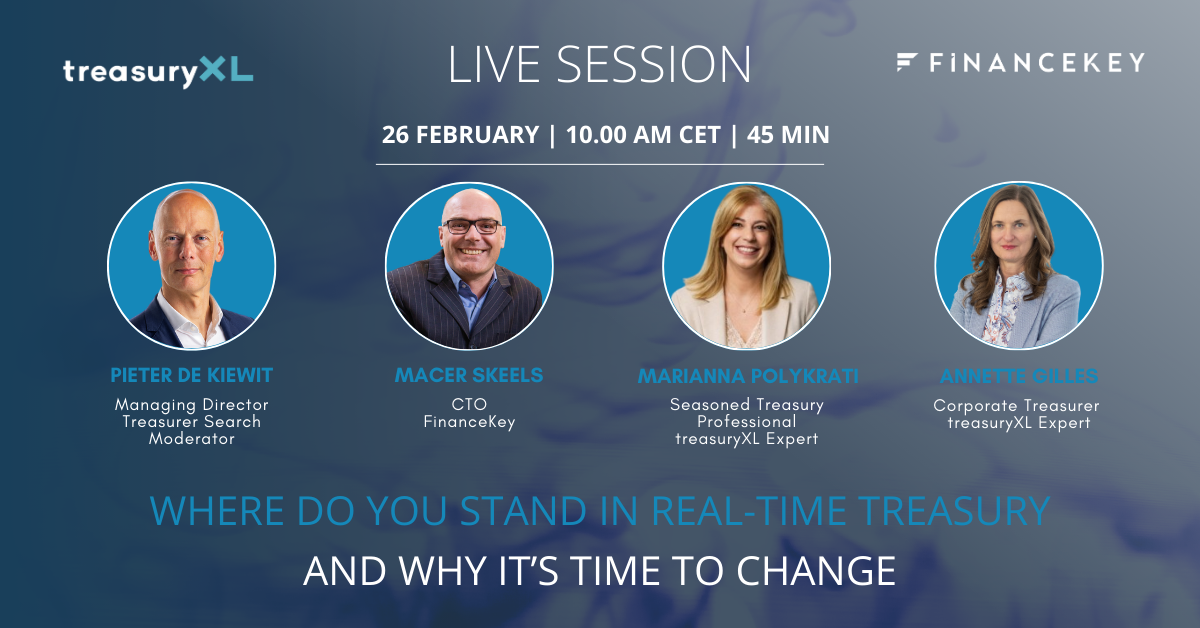| 05-12-2017 | treasuryXL |
 In the financial industry an option is an instrument, based on financial derivatives, that enable the buyer of the option to obtain the right, but not the obligation, to buy or sell an underlying product/asset at an agreed price on or before a certain date in the future. As simple descriptions go, this requires a lot of understanding about different subjects. It is the intention of this article to clearly explain all the terms mentioned above.
In the financial industry an option is an instrument, based on financial derivatives, that enable the buyer of the option to obtain the right, but not the obligation, to buy or sell an underlying product/asset at an agreed price on or before a certain date in the future. As simple descriptions go, this requires a lot of understanding about different subjects. It is the intention of this article to clearly explain all the terms mentioned above.
Financial derivative
The value of an option is specifically linked to the price of an asset – referred to as the underlying instrument. This could be a share, bond, currency pair, interest rate etc.
Right, but not the obligation
When you purchase an option, this gives you the right in the future to exercise the option with the counterparty. However, you are not obligated to exercise your right.
If you have bought an option with the right to buy an asset, but the price of the asset at maturity is lower than the agreed price on the option, you are not obligated to buy the asset as it would be cheaper to buy the asset in the open market at the lower price. However, the seller of the option always has the obligation to sell to you if you exercise your option
Agreed price
This is called the strike price – it is a fixed price. If you purchase an option that gives you the right to buy the underlying instrument at EUR 65 and the market price rises to EUR 75, then you would exercise your right under the option to receive the underlying instrument at EUR 65 and either hold or immediately sell at EUR 75 for a profit (as long as the premium was smaller than EUR 10).
Buy or Sell/Call or Put
If you want the right to buy an asset in the future you purchase a Call option.
If you want the right to sell an asset in the future you purchase a Put option.
Agreed date
This is called the expiration date and means that after that date no future transaction can be derived from the option – the option expires on that date.
Premium – the cost
When you purchase an option, the seller receives a financial settlement upfront. This is called the premium. As an option can be compared to an insurance policy, the premium on an option is similar to the premium paid upfront on an insurance policy.
Premium – the price
Major components used to determine an option price include interest rates, time to expiry, volatility, intrinsic value and the current asset price. Interest rates are used to determine the time value of money between now and the expiry date. Volatility is a measure of the dispersion of the price as in statistical analysis – volatility is another word for uncertainty. The more uncertainty there is, the greater the effect on the option price. Intrinsic value is the difference between an asset’s current price and the strike price.
The underlying
This refers to the specific asset that is being traded. Normally trading is an agreed lot size. 1 option would represent 100 shares for example.
Secondary market
If options are traded with an exchange, then there is a secondary market. You could buy an option, see the price rise, but consider it would not reach the strike price. Your option could then be sold to a third party via the exchange for a higher price than the premium you paid.
If you trade privately (over-the-counter) then your option can not be sold to a third party.
Types of Options
American – can be exercised on any day before or on expiring date
European – can only be exercised on the expiry date
More exotic variations like Bermudan, Binary and Exotic
Why trade Options?
Options give you exposure to an underlying asset at the cost of the premium as opposed to the full face value. This means your position can be leveraged for the same sum of money. If you hold an asset, you can also write the underlying option – a strategy called covered option. You own the asset and receive the premium reducing the cost of the asset. But if exercised, you must deliver the asset.
You could be looking at an acquisition – by purchasing options you would have the opportunity to buy the underlying at agreed prices before the market moved up. If the acquisition fell through, it would only cost you the premium.
Options that you did not know you had bought
Early repayment of a mortgage without a penalty is a form of embedded option.
Bonds that have a convertible character – exchange at a pre-agreed price for stock
If you have arranged a credit facility via a bank for an agreed period of time, you have paid for the option to drawdown against the agreed line of credit.
Who wins?
Studies show that 75% of all options that are purchased expire without being exercised. Obviously, the winners are the writers of options as they receive the premium but are not obligated to perform. This is mostly due to changes in the market or the timing being wrong. If you purchase a call option, then you must add the premium to the strike price to obtain your gross purchase price. Only if the price rises above the gross price is it rewarding to exercise the option.
 Lionel Pavey – Cash Management and Treasury Specialist
Lionel Pavey – Cash Management and Treasury Specialist
[button url=”https://www.treasuryxl.com/community/experts/lionel-pavey/” text=”View expert profile” size=”small” type=”primary” icon=”” external=”1″]
[separator type=”” size=”” icon=””]


 During our stay in South Africa I was reading an article in Die Burger (newspaper for Afrikaners) where a spokesman of Cape town-based PWC gave his ideas on the recent rise of Bitcoin and the future of Blokketting (Afrikaans for Blockchain). This inspired me to write this blog. Since I started writing about blockchain I categorically refused to use the term Bitcoin. But this time it is different. As Bitcoin nears the end of a record-breaking year, it seems an appropriate time to dive into this – by many traditional players said – over-hyped thing. Others describe this fascination for Bitcoins as a “speculative mania”. The broader public has discovered this phenomenon. I will not say it is (already) the end of the rise in Bitcoins or other crypto currencies. But let me be clear: Bitcoin is a lot not!
During our stay in South Africa I was reading an article in Die Burger (newspaper for Afrikaners) where a spokesman of Cape town-based PWC gave his ideas on the recent rise of Bitcoin and the future of Blokketting (Afrikaans for Blockchain). This inspired me to write this blog. Since I started writing about blockchain I categorically refused to use the term Bitcoin. But this time it is different. As Bitcoin nears the end of a record-breaking year, it seems an appropriate time to dive into this – by many traditional players said – over-hyped thing. Others describe this fascination for Bitcoins as a “speculative mania”. The broader public has discovered this phenomenon. I will not say it is (already) the end of the rise in Bitcoins or other crypto currencies. But let me be clear: Bitcoin is a lot not!

 With the steady rise of Fintech within the finance industry some people are already calling for the demise of banks as the historical financial partner of choice for corporates. Certainly, Fintech is showing itself to be very dynamic, offering many new products and solutions, and being a lot swifter than the banks. Banks seem to have grown too big and complacent, are being weighed down by new rules and regulations, are less prominent in the field of funding for corporates, and possibly have lost their focus on what used to be core businesses. But let us examine the relationship between bank and client.
With the steady rise of Fintech within the finance industry some people are already calling for the demise of banks as the historical financial partner of choice for corporates. Certainly, Fintech is showing itself to be very dynamic, offering many new products and solutions, and being a lot swifter than the banks. Banks seem to have grown too big and complacent, are being weighed down by new rules and regulations, are less prominent in the field of funding for corporates, and possibly have lost their focus on what used to be core businesses. But let us examine the relationship between bank and client. De
De 
 The markets and the ECB feel that the economy is doing very well. It can be compared to Goldilocks – not too hot and not too cold. Is it possible that the Eurozone could be entering a period of continued growth with little or no immediate prospect for rising inflation? A quick scan of the relevant markets would appear to suggest that it is possible. Let us examine where the markets are now.
The markets and the ECB feel that the economy is doing very well. It can be compared to Goldilocks – not too hot and not too cold. Is it possible that the Eurozone could be entering a period of continued growth with little or no immediate prospect for rising inflation? A quick scan of the relevant markets would appear to suggest that it is possible. Let us examine where the markets are now.


 In the financial industry an option is an instrument, based on financial derivatives, that enable the buyer of the option to obtain the right, but not the obligation, to buy or sell an underlying product/asset at an agreed price on or before a certain date in the future. As simple descriptions go, this requires a lot of understanding about different subjects. It is the intention of this article to clearly explain all the terms mentioned above.
In the financial industry an option is an instrument, based on financial derivatives, that enable the buyer of the option to obtain the right, but not the obligation, to buy or sell an underlying product/asset at an agreed price on or before a certain date in the future. As simple descriptions go, this requires a lot of understanding about different subjects. It is the intention of this article to clearly explain all the terms mentioned above.